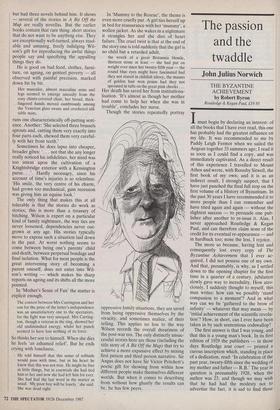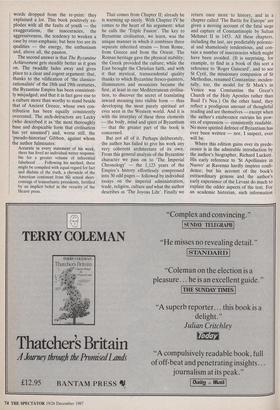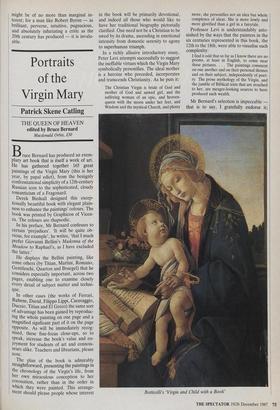The passion and the twaddle
John Julius Norwich
THE BYZANTINE ACHIEVEMENT by Robert Byron
Routledge & Kegan Paul, £19.95
Imust begin by declaring an interest: of all the books that I have ever read, this one has probably had the greatest influence on my life. It was recommended to me by Paddy Leigh Fermor when we sailed the Aegean together 33 summers ago; I read it as soon as I could find a copy, and was immediately captivated. As a direct result of this experience I travelled to Mount Athos and wrote, with Reresby Sitwell, the first book of my own; and it is as an indirect result, I strongly suspect, that I have just punched the final full stop on the first volume of a History of Byzantium. In the past 30 years I have recommended it to more people than I can remember and have tried again and again — without the slightest success — to persuade one pub- lisher after another to re-issue it. Alas, I never approached Routledge & Kegan Paul, and can therefore claim none of the credit for its eventual re-appearance — and in hardback too; none the less, I rejoice.
The more so because, having lent and consequently lost every copy of The Byzantine Achievement that I ever ac- quired, I did not possess one of my own. And that, presumably, is why, as I settled down to the opening chapter for the first time in a quarter of a century, jubilation slowly gave way to incredulity. How atro- ciously, I suddenly thought to myself, this man writes: how can we possibly 'stand companion to a moment'? And in what way can we be 'gathered to the brow of infinity' — whatever that may mean — by `initial achievement of the scientific revolu- tion'? How, in short, can I ever have been taken in by such sententious codswallop? The first answer is that I was young, and that this is a young man's book. In its first edition of 1929 the publishers — in those days Routledge tout court — printed a curous inscription which, standing in place of a dedication, read: 'In celebration of the past year, twenty-fifth since the wedding of my mother and father — R.B.' The year in question is presumably 1928, when the author was 23, and though we may wish that he had had the modesty not to advertise the fact, it is sad to find those words dropped from the re-print: they explained a lot. This book positively ex- plodes with all the faults of youth — the exaggerations, the inaccuracies, the aggressiveness, the tendency to weaken a case by over-emphasis; but here too are its qualities — the energy, the enthusiasm and, above all, the passion.
The second answer is that The Byzantine Achievement gets steadily better as it goes on. The twaddle fades away and gives place to a clear and cogent argument: that, thanks to the vilification of 'the classico- rationalists' of the 18th and 19th centuries, the Byzantine Empire has been consistent- ly misjudged; and that it in fact gave rise to a culture more than worthy to stand beside that of Ancient Greece, whose own con- tribution has been equally consistently overrated. The arch-detractors are Lecky (who described it as 'the most thoroughly base and despicable form that civilisation has yet assumed') and, worse still, the `pseudo-historian' Gibbon, against whom the author fulminates:
Accurate in every statement of his work, there has lived no individual writer responsi- ble for a greater volume of inferential falsehood . . . Following his method, there might be compiled with equal regard for fact and disdain of the truth, a chronicle of the American continent from the sexual short- comings of transatlantic presidents, fortified by an implicit belief in the veracity of the Hearst press.
That comes from Chapter II; already he is warming up nicely. With Chapter IV he comes to the heart of his argument: what he calls the 'Triple Fusion'. The key to Byzantine civilisation, we learn, was the unique manner in which it combines three separate inherited strains — from Rome, from Greece and from the Orient. The Roman heritage gave the physical stability; the Greek provided the culture; while the East brought the Christian faith, and with it that mystical, transcendental quality thanks to which Byzantine fresco-painters, illuminators and mosaicists became the first, at least in our Mediterranean civilisa- tion, to discover the secret of translating inward meaning into visible form — thus developing the most purely spiritual art ever seen in the Western world. And it is with the interplay of these three elements — the body, mind and spirit of Byzantium — that the greater part of the book is concerned.
But not all of it. Perhaps deliberately, the author has failed to give his work any very coherent architecture of its own. From this general analysis of the Byzantine character we pass on to 'The Imperial Chronology' — the 1,123 years of the Empire's history effortlessly compressed into 30 odd pages — followed by individual essays on the imperial administration, trade, religion, culture and what the author describes as 'The Joyous Life'. Finally we return once more to history, and in a chapter called 'The Battle for Europe' are given a moving account of the fatal siege and capture of Constantinople by Sultan Mehmet II in 1453. All these chapters, including the last, are predictably polemic- al and shamelessly tendentious, and con- tain a number of inaccuracies which might have been avoided. (It is surprising, for example, to find in a book of this sort a reference to 'Roger Guiscard', and to see St Cyril, the missionary companion of St Methodius, renamed Constantine; inciden- tally, too, the model for St Mark's in Venice was Constantine the Great's Church of the Holy Apostles rather than Basil I's Nea.) On the other hand, they reflect a prodigious amount of thoughtful reading and are themselves — except when the author's exuberance outruns his pow- ers of expression — consistently readable. No more spirited defence of Byzantium has ever been written — nor, I suspect, ever will be.
Where this edition gains over its prede- cessor is in the admirable introduction by the author's biographer, Richard Luckett. His early reference to 'St Apollinaire in Nuovo' at Ravenna hardly inspires confi- dence; but his account of the book's extraordinary genesis and the author's early experience of the Levant do much to explain the odder aspects of the text. For an academic historian, such information might be of no more than marginal in- terest; for a man like Robert Byron — as brilliant, perverse, intuitive, pugnacious, and absolutely infuriating a critic as the 20th century has produced — it is invalu- able.












































































































 Previous page
Previous page